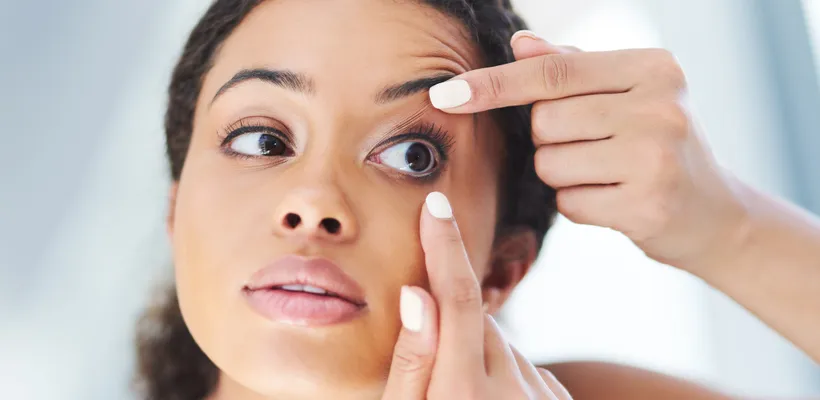
Published: 18th September, 2019 in: Health Health Advice
With the number of contact lens users in the UK exceeding 3.7 million, taking care of the UK’s eyes and contact lenses has never been more important. Contact lenses can be a major blessing to those struggling with impaired vision. Glasses may not always be a suitable option. For example, some occupations, such as firefighting or active sport hobbies, may mean that glasses cannot be worn. Another common complaint is lack of comfort. Glasses have been known to induce headaches, cause annoyance and many people simply do not like how they look in glasses. Contact lenses allow all of these, and many more problems to be solved.
Contact lenses are small, curved lenses, placed on the eye in order to improve eyesight. They are an alternative to glasses, usually made out of hydrophilic plastics, silicone hydrogel or rigid gas permeable plastic, dependent on the type of lens. Contact lenses come in a range of types from daily, disposable lenses to half-monthly and monthly lenses. They can be soft or hard, with the majority of wearers using soft contact lenses.
Contact lenses work in the same way that glasses do, by altering the direction of light hitting the eye in order to focus it onto the retina, thus improving sight. Soft lenses utilise the hydrophilic plastic, a material that remains soft and supple so long as it is absorbing water. Soft contact lenses, designed to be worn for extended periods of time, generally use silicone hydrogel. This is because it combines water absorption with silicone to create a lens that remains moist and allows oxygen to reach the eye. Finally, hard lenses use rigid gas permeable plastics such as acrylate, silicone or fluorine. They allow oxygen to enter the eye and generally last longer than soft lenses.
Wearing contacts requires maintenance, ensuring lens cleaning regimes are consistently followed. Without a strong hygiene regime, wearers are more prone to infections, scratches, and injuries to the eye.
Despite contact lens producers taking steps to ensure oxygen is still able to reach the eye, the amount of Oxygen reaching it is still significantly less than for non-contact wearers. It is important, for the production of tears, that a steady flow of Oxygen reaches the eye. Without tears, eyes will become dry and irritated.
Luckily, we have a wide range of products, suitable for contact lens wearers, to solve these issues!
There are many products in the eye care market to help alleviate the symptoms of dry, itchy eyes. Eye drops, or artificial tears, form tear-like lubrication helping to soothe the eyes, removing the dry and irritated feeling. Whilst some eye drops can be used whilst wearing contact lenses, such as Blink’s Contacts Eye drops or Vizulize Natural Eye Brightener Drops, some drops should only be used after contacts have been removed.
Viscotears offers a gel-like drop called Viscotears Liquid Gel (for Dry Eyes). Although contacts must be removed to use this, they can be replaced after 30 minutes making it an effective solution to ward off dry eyes, if applied in the morning. Both Sno-tears and Liquifilm Tears can be used with hard contacts but should not be used in conjunction with soft contact lenses. Soft contact lenses can absorb the benzalkonium chloride contained within these products, causing discolouration of lenses and possible irritation.
For overnight eye care, Xailin Night Lubricating Eye Ointment offers soothing relief from dry eye symptoms, such as soreness, gritty sensations and irritation. Not to be used whilst contact lenses are being worn, the ointment should be applied before bed, so you wake up with eyes that feel refreshed and ready for contacts.
Unclean lenses can also contribute to eye irritation therefore, a good contact lens hygiene regime is essential.
In order to clean reusable contact lenses, you must first ensure that both your hands and the contact lens case are clean and dry. Washing your hands before touching the lenses or your eyes reduces the risk of infections and irritation. To wash the lens case, it should be rinsed with contact lens solution and allowed to air dry upside down on a clean surface or tissue. Once dry you are able to refill the case with contact lens solution. Contact lens cases should be replaced regularly.
After these steps have been completed you can remove your contacts one at a time, placing the contact lens in the palm of your clean hand. Apply a few drops of cleaning solution and rub the contact gently to clean the lens. It should then be rinsed, once again using the cleaning solution, and placed into the freshly cleaned and filled case. Tap water should never be used to rinse or clean lenses as it may contain impurities which can lead to injury or infection.
There are various cleaning solutions for contact lenses on the market, with some boasting an all in one solution, such as the Vizulize Contact Lens Solution. The solution is designed for daily use, the removal of protein, to disinfect and has moisturising properties for comfortable wear. Other companies, namely Boston, offer separate products for different functions. Recommending use of their advanced comfort conditioning solution after cleaning with their basic advance cleaner; the method of cleaning contact lenses is a personal preference.
Before using any of our eye care solutions, make sure to read included leaflets for directions on uses, ingredients and any possible side effects or warnings. If you are unsure of suitability, consult a doctor or pharmacist before use.
In conclusion, it is clear that contact lenses can be highly advantageous in modern life, allowing the wearer to see without the use of glasses. They are not however without their issues but, our extensive range of contact lens care solutions helps to maintain good eye health and ensure wearing contacts is both comfortable and safe.